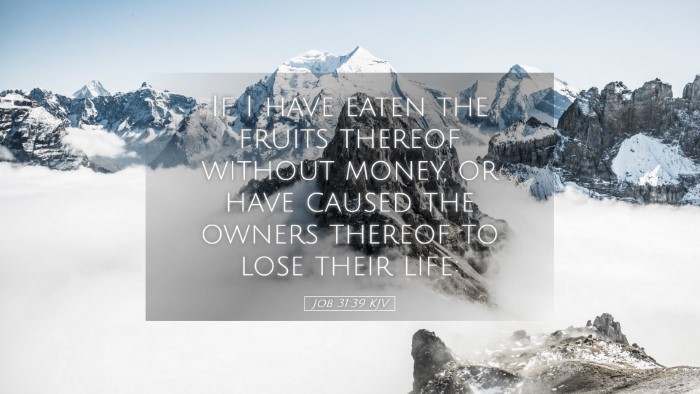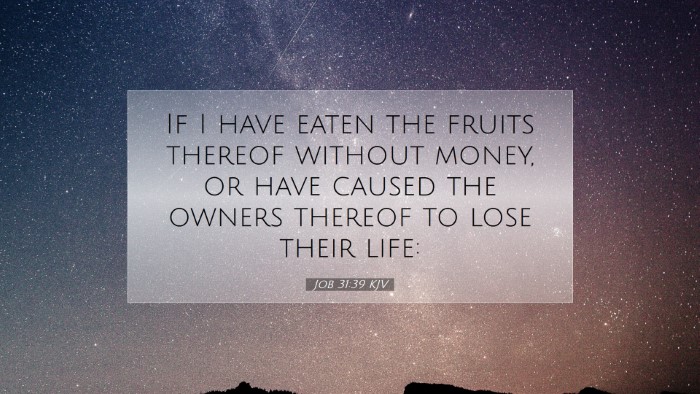Commentary on Job 31:39
Job 31:39 (KJV): "If I have eaten the fruits thereof without money, or have caused the owners thereof to lose their life:"
Introduction
The verse of Job 31:39 captures a pivotal moment in Job's defense of his integrity as he addresses the consequences of his actions and the moral principles that govern his life. It is essential for readers—pastors, scholars, and students—to understand the gravity of his claims and the broader implications for righteousness and social justice embedded in the text.
Job's Ethical Assertions
In this verse, Job is making a strong assertion regarding his ethical conduct concerning land and property. This implies both a respect for the ownership of others and a recognition of the moral imperative to adhere to social justice. Job's claim revolves around three key concepts:
- Ownership: Job acknowledges that the land and its fruits belong to their rightful owners, emphasizing the respect required for their livelihood.
- Responsibility: He affirms responsibility not just to himself but also to the socio-economic framework that supports the vulnerable around him.
- Community: Job's outward focus illustrates his awareness of communal interaction and the moral obligations therein.
Insights from Matthew Henry
Matthew Henry emphasizes that Job is challenging the accusations placed upon him by asserting his innocence and moral uprightness. He magnifies the following points:
- Social Justice: Henry elucidates that Job's words reflect an inherent understanding of social justice and the importance of accountability to society.
- Moral Integrity: He points out that Job's integrity does not merely concern personal ethics but extends to his interaction with others, especially those who are economically disadvantaged.
- Community Welfare: Job expresses an ethic that cares about the well-being of his neighbors, indicating communal responsibilities that go beyond mere legal obligations.
Insights from Albert Barnes
Albert Barnes delves deeper into the translation nuances and potential implications regarding the phrase "eaten the fruits thereof without money." His commentary highlights:
- Economic Justice: Barnes interprets this as a reference not only to economic transactions but also to moral considerations—how one engages with the resources owned by others.
- Judgment of Actions: He notes that for Job, the failure to uphold such integrity would be a significant wrongdoing, placing himself under divine accountability.
- Wealth and Power Dynamics: Barnes argues that Job's claim is a universal principle that addresses the dynamics between wealth, power, and justice, prevalent throughout the Scriptures.
Insights from Adam Clarke
Adam Clarke offers a rich interpretative analysis focusing on the moral and societal implications of Job's statement:
- The Implication of Guilt: Clarke pushes against the notion that wealth can coexist with dishonorable practices, suggesting true wealth will never come at the expense of another's life.
- Understanding Loss: He deepens the perspective of loss, urging readers to contemplate the spiritual and emotional loss that accompanies exploitation and greed.
- Divine Accountability: Clarke stresses the idea that ultimately, the Lord examines the hearts of people and that true integrity is a matter of the heart, not just of deeds.
Theological Reflections
When reflecting on the theological implications of Job 31:39, it is essential to consider its broader resonance in the context of the entire Scripture:
- Jesus’ Teachings: The ethical principles articulated in this verse resonate with Christ's teachings in the Gospels, where respect for others and accountability to God are paramount.
- Community Responsibility: The Church today can draw from Job's example in fostering communities that value justice, mercy, and shared responsibility.
- Eschatological Hope: This passage aligns with the biblical narrative of eschatological justice where the oppressed will ultimately find vindication and restoration.
Conclusion
Job 31:39 stands as a rich reservoir of wisdom concerning ethical living, communal responsibility, and divine accountability. As noted by Henry, Barnes, and Clarke, Job’s plea for righteousness invites a reflective understanding that transcends his individual plight. For modern readers and theologians, the verse serves as a clarion call to engage deeply with social ethics, advocating for justice not only as a personal affair but as a biblical mandate for community engagement.


